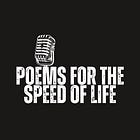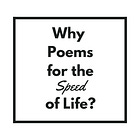S4, E4: "Christmas" by John Betjeman
The fourth episode of the new series of Poems for the Speed of Life, on the theme of Christmas.
Welcome to another episode of Poems for the Speed of Life with Shane Breslin, entrepreneur, writer and poetry advocate.
This is the fourth episode of a new series of the podcast, poems on the theme of Christmas. Today’s poem is "Christmas" by John Betjeman.
If you’d like to read along while you listen, you can find "Christmas" by John Betjeman here.
Commentary on "Christmas" by John Betjeman
John Betjeman was one of Britain's best-loved poets of the 20th century, and was Poet Laureate for 12 years until his death in 1984 at the age of 77.
There's something amazing about the way Betjeman builds this poem. He starts with what we might call a ground-level view of Christmas — the Tortoise stove being lit, the winter rain on stained-glass windows, the lovely phrase and image of the “lamp-oil light across the night”, the holly in the hedge. And then he moves outward, through Britain’s villages and provincial towns, into London itself, and finally over the seas to Palestine, to the Holy Land, to the “Baby in an ox’s stall”, to the origin of his religion and the big questions he asks.
That big question, which sits at the heart of this poem and gets asked three times: “And is it true?”
It comes after all these wonderfully observed details of an English Christmas, after all the decorations and the bunting and the bells and the sleepless children’s hearts. “And is it true?”
This isn't just the poet's question. This is a question for all of us. After all the rushing around, after all the preparations, after all the “sweet and silly Christmas things”, as Betjeman calls them, we might find ourselves in a quiet moment asking this question. He asks it three times, twice in a row and then again at the start of the next stanza. “And is it true? And is it true?”
This isn't a question that gets asked once and answered. It lives with us, urging us to ask it again and again.
The poem doesn't dismiss any of the Christmas traditions and trappings. As Betjeman calls them, the “tissued fripperies”, the “bath salts and inexpensive scent”, even the “hideous tie so kindly meant” — these are presented with a kind of tender understanding. They are, after all, all expressions of love, aren't they? They're all ways we try to reach each other.
And we are so inarticulate, we find it hard to express that love. We might not have the words. Even if we have the words, we might not have the courage to use them.
Then the ending, to the source and origin story. “That God was man in Palestine / And lives today in Bread and Wine.”
These lines shift from past tense to present tense. “God was man” to “and lives today”.
You don’t have to be religious to have some sense of the ancient truths, ancient wisdoms, ancient questions, and how they can arise in our present moment.
And aren’t we all seeking that truth? The truth that makes sense of all the rushing around, all the preparations, at this time of year.
Perhaps, if you find a quiet moment, allow that question, or a variation of the question, “And is it true?”, to come to you.
Thank you again for listening to Poems for the Speed of Life.
I’ll be back soon with another poem in this series, the Christmas series, where I am trying to introduce you the listener, wherever you are in the world, to some of the writers who have masterly managed to capture things that are almost impossible to capture, the feelings of goodness and peace and love that this time of year brings to our families and our friendships and our hearts and our minds.
See you next time on Poems for the Speed of Life.
The Christmas Series
This is a poem from the Christmas poems series of Poems for the Speed of Life.
I know there are listeners and followers of this podcast all over the world. I know that there are many people here with many different religions, and many different faiths — or none — and I know that Christianity is just one.
If a series about Christmas leaves you in any way cold or distant, let me say that the goal of this series of the podcast is not to evangelize about Christianity, nor to show the benefits of one way of being or thinking or believing at the expense of all the others.
What it is, though, is my attempt to create something that captures something of the goodness of this time of year.
Because when I think of Christmas, and when I put aside all the dogmas of us-versus-them religion, and when I put aside the mass consumerism of the so-called “shopping season”, and when I really think of this time of year, of these few weeks each December, what I think, and what I feel, is captured in one or two words.
Goodness. Love.
When you’re about on the streets at this time of year — and yes, I’m probably talking about Europe, or the Americas, or the other places that might be part of so-called “Western Civilization” or the “Western Hemisphere” — there is something always good in the air. It is something that contains magic.
It is communal. It is generous. It is kind.
It is goodness.
It is love.
And maybe — for who am I to have any certainty about what is and what isn’t? — maybe it is God’s love, maybe it is the love of Christ, that comes to us and through us at this time of year.
Whatever it is, it is a love and a goodness that never — not in my experience anyway — comes fully through the giving or receiving of gifts, but arrives in the space between. In a quiet moment. In the look in a loved one’s eye or some fleeting moment on the street or at work, when something passes unsaid, something that remains unsaid because we might not have the words to say it, but is still somehow completely understood.
And so, this series of the podcast will include poems, and some other pieces of writing, that touch on this. Poems and passages of writing that actually do find the words that capture some of that wonder and magic. Some of that invisible spirit.
Some of that goodness. And some of that love.
Long-time listeners will know that I sometimes broaden my definition of what a poem is to include in Poems for the Speed of Life.
Sometimes I offer song lyrics, as in “The Best Day of My Life” by Tom Odell in Episode 30, “The West Coast of Clare” by Andy Irvine in Episode 45, and “The Living Years” by Mike Rutherford, in Episode 2 of the recent Fatherhood poems series.
I will do that again in this series, with a song written by an Irishman who said he has written dozens of — in his words — “dreadful maudlin songs”, but that this one came to him from somewhere else, some other place, some unseen but always present source of creativity.
Sometimes I offer sections of prose that, to me, carry all the power of poetry, like “Desiderata” by Max Ehrmann in Episode 165 and a passage from Vaclav Havel’s “Hope” in Episode 187.
In this series I will include, again, the long prose poem by Dylan Thomas titled “A Child’s Christmas in Wales” and the series will also feature a segment from “A Christmas Carol” by Charles Dickens, which, no matter how good and how memorable all the various movie adaptations might be, stands above them all as a peerless work of writing. I aim to read both Dickens and Thomas every December in any case, and here I will read them for you.
I will read a newspaper editorial published in the 1890s, and I will also, of course, read poems — by an English poet laureate, by a late great Irish poet, by several Americans, dead and alive, and by others, from elsewhere around the world.
This series is for everyone.
It’s for everyone who might want or need to feel some of this goodness and some of this love, especially in our world which sometimes seems like it’s in short supply of both.
It will be for everyone who wants to give generously, and not just in material or monetary ways, but in the generosity of spirit and consciousness and goodwill that will always be useful, and cherished, by the people you come into contact with.
I look forward to bringing you the new series of Poems for the Speed of Life, on Christmas, starting with Episode 1, on Saturday, November 23rd and continuing through December 2024.
Thank you for listening. If you’re not already subscribing or following, please do so, for free, in your podcast app or in Spotify. Keep an eye on your podcasts feeds, and you’ll be hearing from me again very soon.
See you soon.
For a detailed outline of the mission and purpose behind this podcast, please check out these two episodes:
If you’re on social media, you can follow on Instagram here and Facebook here.
You can subscribe to or follow the show for free wherever you listen to podcasts.
To leave the show a review:
On Spotify. Open the Spotify app (iOS or Android), find the show and tap to rate five-stars.
On Apple. Open your Apple Podcasts app, find the show and tap to rate five-stars.
On Podchaser. Open the Podchaser website, find the show and tap to rate five-stars.








